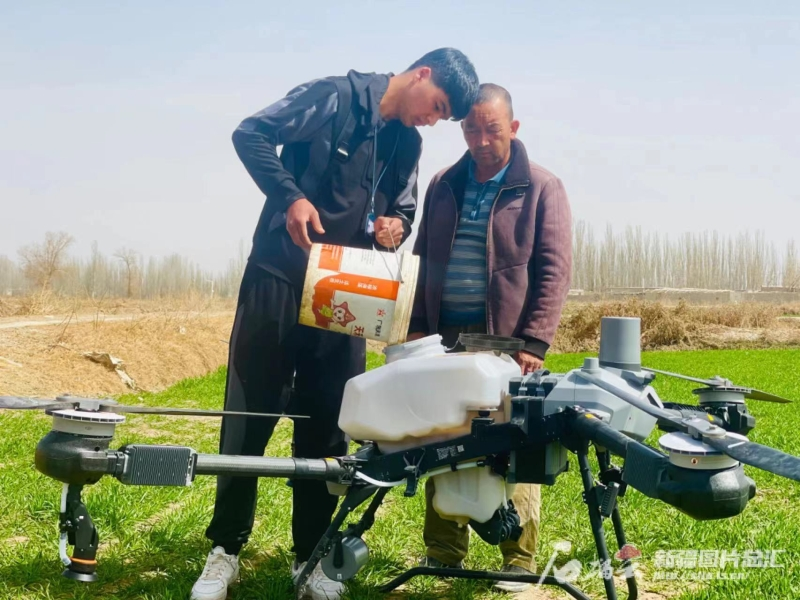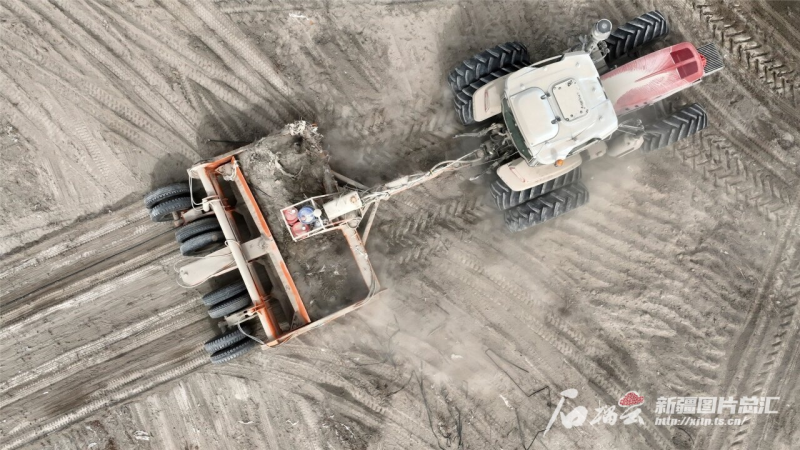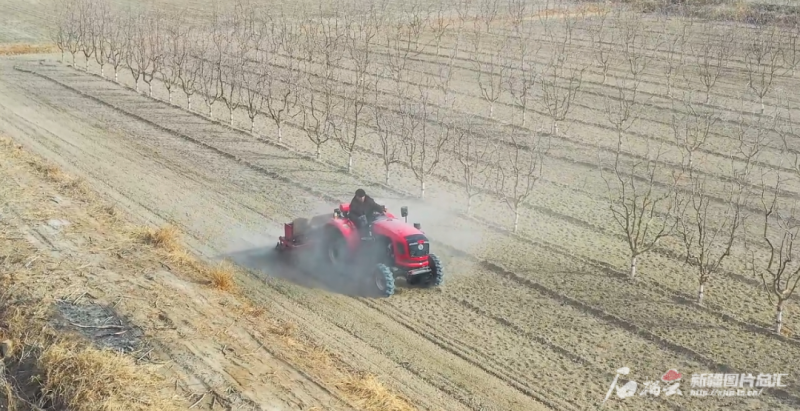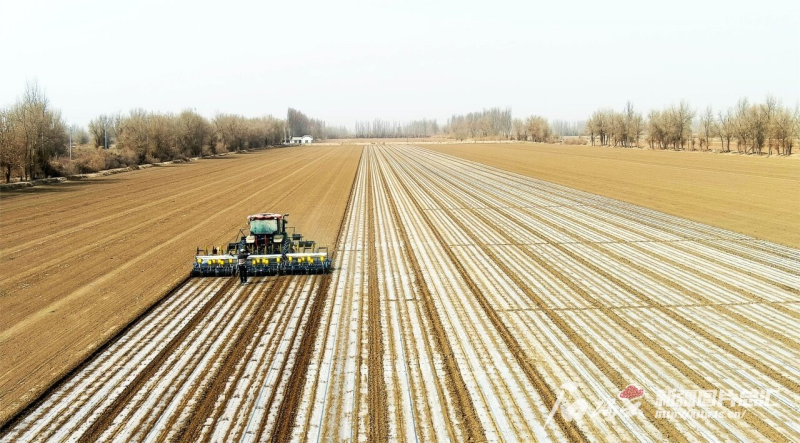Shiliuyun-Xinjiang Daily (Reporter Jazira Nisbek) news: People are using advanced technology to prepare for spring plowing in northwest China’s Xinjiang Uygur Autonomous Region, the countryside is brimmed with energy and vitality.
Smart technology in spring plowing
On March 23, 2024, four unmanned beet seeders equipped with China's Beidou Navigation Satellite System working back and forth in a high-standard beet demonstration field in Seman Village, Hexia'awati Town, Payzawat County, Kashi Prefecture, northwest China’s Xinjiang Uygur Autonomous Region.
"This seeder can automatically complete a series of operations, such as planting, mulching film, laying drip irrigation belt, covering soil, and so on, with straight ridges and uniform spacing." said Chen Jiansheng, a grower.
Increasingly, agricultural machinery equipped with advanced technology, such as unmanned seeders, precision seeders, drip irrigation technology under plastic film, and an unmanned aerial vehicle (UAV) for plant protection, is utilized to enhance farmland production around Xinjiang.

Photo taken on March 20, 2024 shows agricultural machinery operator Abdusalam Sawur (left) adds pesticides to the UAV in the wheat field of Aqiale Village, Sahan Town, Yengisar County, Kashi Prefecture, northwest China’s Xinjiang Uygur Autonomous Region. (Photo by Nazakat Jurat)
In 2023, Zhang Hengjun, an agricultural machinery operator from Kalataheer Village in Kuoke'agashi Township, Fuhai County, Altay Prefecture, bought a wheat seeder that increased working capacity from seeding 24 rows to 28 rows at once.
Zhang Hengjun explained that farmers now rely more and more on science and technology. This is due to the high operational efficiency of the new machine, which has become more effective after being equipped with China's Beidou Navigation Satellite System. Although the new machine is more expensive, it is proving to be a valuable investment for farmers.
In 2024, over 21,333 hectares of winter wheat were planted in Awat County, Aksu Prefecture. Currently, the winter wheat is thriving and turning green, and the villagers in Yusitunkekumubashi Village, Ayibage Town, are busy cleaning up plastic film. Since the implementation of drip irrigation technology under film to enhance the temperature and moisture of the winter wheat, the yield per mu has reached approximately 600 kg. This has further encouraged the villagers to plant wheat, thereby stabilizing the area of grain planting.
Agriculture is becoming increasingly digital and intelligent, with ongoing improvements in training for professionals in agricultural science and technology.
“This year, Kashi will welcome a number of talented individuals in agricultural science and technology, as well as promote a batch of new varieties, technologies, and machinery. Furthermore, the comprehensive mechanization rate of cultivation and harvest of major crops is expected to reach over 87 percent,” said Jiang Chonghai, a staff member from the Agricultural and Rural Affairs Bureau of Kashi Prefecture.
A good helper in farming
In Xinjiang, high-tech farming methods have not only increased agricultural efficiency, but also improved agricultural product safety.

Aerial Photo taken on March 20, 2014 shows villagers drive agricultural machinery to level farmland in Ailikantuman Village, Tuobuliqi Township, Korla City, Bayingolin Mongolian Autonomous Prefecture, northwest China's Xinjiang Uygur Autonomous Region. (Photo by Cho Hura)
On March 21, two high-powered tractors equipped with China's Beidou Navigation Satellite System pulled new seeders to work in the field at a spring wheat planting base in Yangjiadao Village, Liuhudi Town, Manas County.
"These are high-standard farmlands, all of which adopt water and fertilizer integration technology. During spring plowing, machines are used to improve the efficiency and accuracy of the sowing. This lays the foundation for later mechanized management and harvesting," said Hou Wenshuang, a grower in Yangjiadao Village, Liuhudi Town.
At present, Yangjiadao Village has achieved 100 percent mechanization in wheat planting. This advancement has helped farmers save on labor and planting costs while also increasing the wheat yield from about 200-300 kg in the past to approximately 500 kg at present.

Photo shows a villager sows spring wheat in Kunqi Village, Wutamu Township, Ruoqiang County, northwest China’s Xinjiang Uygur Autonomous Region. (Photo provided by the Media Convergence Center of Ruoqiang County)
Xinjiang Xinqiao Intelligent Water Co., Ltd. has developed a remote operation platform for intelligent agriculture management in Bositan II Village, Bixibage Township, Kuqa City, Aksu Prefecture. This platform helps farmers precisely water and fertilize their winter wheat fields, even if the fields are several kilometers away. It also helps them control the amount of water used, resulting in a 30 percent reduction in average water consumption per mu. Additionally, it helps farmers save more than 20 percent on fertilizer costs.
In the digital agriculture application demonstration base of Hejiawang farmers' specialized cooperative in Bulikai Village, Wenyaer Town, Yining County, Ili Kazak Autonomous Prefecture, several intelligent equipment such as a small weather station, soil moisture automatic monitoring station, and an insect detection system, are installed to monitor field humidity, light intensity, and soil moisture at all times. Moreover, the equipment is capable of monitoring field seedling, insect, and disaster conditions. This system allows villagers to monitor the entire crop growth process from their computers without leaving their homes.
“More than 333.33 hectares of land under the trusteeship of our cooperative can basically be operated by machinery, and one person can now manage the farmland that previously required several people to manage, significantly improving efficiency,” Liu Junjie, the manager of supply chain center of Xinjiang Hewang Agricultural Science and Technology Co., Ltd., said.
The application's requirements necessitate an upgrade in technology
Currently, Qingyuan Plastic Industry Co., Ltd. of Yingisar County is engaged in the production of drip irrigation belts, and has already received orders worth more than five million yuan (about 0.7 million U.S. dollars). The production line is being operated at its maximum capacity. The company is well aware of the importance of efficient use of water resources, which is the reason why it optimizes its products based on customers' requirements.
"This year's product incorporates new technology that enhances water conservation efficiency, resulting in double the amount of water saved," said Li Hailong, manager of the company.
As the temperature rises, cotton planting in Xinjiang has begun. Nowadays, the application of mechanization, digitalization and intellectualization of cotton cultivation in Xinjiang is becoming more and more extensive.

Photo taken on March 19, 2024 shows a worker drives agricultural machinery equipped with China's Beidou Navigation Satellite System to sow cotton seeds at high-standard farmland in Alar City, northwest China’s Xinjiang Uygur Autonomous Region. (Photo by Sun Guoquan)
"The agricultural machinery market is highly competitive, with a wide range of products available. Therefore, it is crucial for us to focus on improving our product research and development capabilities," said Zhang Ying, the chief financial officer of Xinjiang Jintiancheng Machinery Equipment Co., Ltd. This year, the company has introduced new agricultural machinery designed for interplanting cotton and fennel, along with a peanut precision seeder featuring an intelligent operating system.
"Xinjiang's leading agricultural machinery manufacturers are now at the forefront of the market in terms of product quality and R&D capabilities," said Wang Xuenong, a researcher at the Institute of Agricultural Mechanization, Xinjiang Academy of Agricultural Sciences. He added that the level of intelligence and digitalization of large-scale agricultural machinery in Xinjiang has been continuously improving. Furthermore, the precision of small agricultural machinery such as seeders and transplanters has also been getting better and better.
The cotton picker manufactured by Xinjiang Boshiran Intelligent Agricultural Machinery Co., Ltd. in Tacheng has become a popular product and helped the company expand its market. By the end of 2023, the company developed a spraying machine that can meet the field management needs of various crops. As soon as the spraying machine hit the market, orders started pouring in. This year, it will be widely used in farming operations.
"The company will continue to optimize products from many aspects and carry out technology iteration to meet the needs of high-quality development of the market," said Bai Jinyan, director of marketing planning at Xinjiang Boshiran Intelligent Agricultural Machinery Co., Ltd.
(A written permission shall be obtained for reprinting, excerpting, copying and mirroring of the contents published on this website. Unauthorized aforementioned act shall be deemed an infringement, of which the actor shall be held accountable under the law.)









